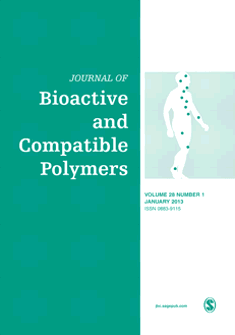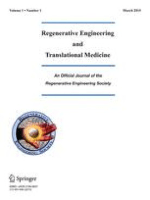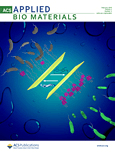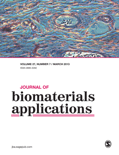
Biomaterials Research
Scope & Guideline
Innovating the future of biomedical engineering.
Introduction
Aims and Scopes
- Tissue Engineering and Regenerative Medicine:
Research in this area focuses on developing biomaterials that can support tissue regeneration and repair. The journal publishes studies involving scaffolds, hydrogels, and other materials designed to mimic the extracellular matrix and promote cell proliferation and differentiation. - Nanotechnology in Medicine:
The journal highlights advancements in nanomaterials and their applications in drug delivery, imaging, and therapy. This includes the development of nanoparticle-based systems that enhance therapeutic efficacy while minimizing side effects. - Biocompatibility and Biointegration:
Research on the interaction between biomaterials and biological systems is a core focus. The journal publishes studies that evaluate the biocompatibility of materials and their ability to integrate with host tissues, essential for successful implantations. - Smart Biomaterials:
The journal emphasizes the development of smart biomaterials that respond to environmental stimuli. These materials can change their properties in response to factors like pH, temperature, or light, making them suitable for targeted drug delivery and controlled release applications. - Immunomodulation and Cancer Therapy:
Research exploring the use of biomaterials to modulate immune responses and their applications in cancer therapy is increasingly featured. This includes the development of biomaterials that enhance the efficacy of immunotherapies.
Trending and Emerging
- 3D Bioprinting and Biofabrication:
An increasing number of studies are focusing on 3D bioprinting techniques to create complex tissue structures. This trend reflects the need for advanced manufacturing processes in tissue engineering. - Immunotherapy and Biomaterials:
There is a growing emphasis on the role of biomaterials in enhancing immunotherapy approaches, particularly in cancer treatment. These studies explore how biomaterials can modulate the immune response to improve treatment outcomes. - Personalized Medicine:
Research is increasingly directed towards developing biomaterials tailored to individual patient needs, utilizing patient-specific cells and materials to enhance therapeutic efficacy and safety. - Extracellular Vesicles and Biomaterials:
The application of extracellular vesicles in drug delivery and regenerative medicine is gaining traction. This emerging theme explores how these biological carriers can be integrated into biomaterial systems for enhanced therapeutic effects. - Microenvironment Engineering:
Recent publications highlight the importance of engineering the cellular microenvironment within biomaterial scaffolds. This includes studies on how to manipulate biochemical and mechanical signals to promote desired cellular behaviors.
Declining or Waning
- Traditional Biomaterials without Functionalization:
There has been a noticeable decline in research focused on traditional biomaterials that do not incorporate advanced functionalization techniques. The trend is moving towards more complex materials that enhance biological interactions. - Non-biomimetic Scaffolds:
The focus on purely synthetic scaffolds that do not mimic natural extracellular matrix properties is waning. There is a growing preference for biomimetic designs that promote better integration and functionality in vivo. - Basic Mechanical Properties Studies:
Research that solely investigates the mechanical properties of biomaterials without correlating to biological outcomes is decreasing. The field is increasingly prioritizing studies that link mechanical performance with biological responses. - Single-use Biomaterials:
Research on single-use biomaterials is less frequently published. There is a shift towards developing sustainable, reusable materials that contribute to environmental conservation and cost-effectiveness.
Similar Journals

Biomaterials Advances
Unleashing Potential: The Next Wave of Biomaterials InnovationBiomaterials Advances is a premier journal published by Elsevier, dedicated to the rapidly evolving field of biomaterials. Established in the United Kingdom, this open-access journal aims to disseminate high-quality, peer-reviewed research that explores innovative biomaterial designs and their applications in bioengineering and biomedical engineering. With an impressive 2023 impact factor reflected in its Q1 rankings across multiple categories—including Bioengineering, Biomaterials, and Biomedical Engineering—Biomaterials Advances stands out as a critical platform for scholars and practitioners faced with advancing technologies and methodologies in the realm of materials science. Covering a broad range of topics, from biocompatibility to tissue engineering, this journal provides an inclusive forum for researchers seeking to contribute to the field. Its Scopus rankings further affirm its position as a leading resource, with notable standings in Biomedical Engineering (Rank #13), Biomaterials (Rank #8), and Bioengineering (Rank #11), all within the top percentiles. Researchers and students alike are encouraged to contribute and engage with the latest findings and innovations in biomaterials through this valuable publication.

JOURNAL OF BIOACTIVE AND COMPATIBLE POLYMERS
Bridging Disciplines in Polymer ResearchJOURNAL OF BIOACTIVE AND COMPATIBLE POLYMERS, published by SAGE PUBLICATIONS LTD, serves as a pivotal platform for disseminating innovative research in the fields of bioengineering, biomaterials, materials chemistry, and polymers. With an ISSN of 0883-9115 and an E-ISSN of 1530-8030, this journal is committed to the advancement of knowledge relating to the interaction of polymers within biological systems and their compatibility in various applications. Operating since 1986, the journal has garnered a respectable presence, ranked in the Q3 quartile across multiple categories in 2023, indicating its relevance and contribution to these dynamic fields. Although not open access, the journal ensures that high-quality research is accessible to subscribers and institutions, reinforcing its importance for researchers, professionals, and students aiming to stay abreast of advancements in polymer science and biocompatibility. By fostering interdisciplinary communication and collaboration, the JOURNAL OF BIOACTIVE AND COMPATIBLE POLYMERS continues to play a crucial role in shaping the future of material applications in health, technology, and industry.

COLLOIDS AND SURFACES B-BIOINTERFACES
Unraveling Complexities of Colloids and SurfacesCOLLOIDS AND SURFACES B-BIOINTERFACES is a premier interdisciplinary journal published by Elsevier, dedicated to advancing the knowledge of interfaces and interactions in biological systems and their applications in biotechnology. With an impressive impact factor that underscores its significance in the field, the journal ranks in the Q1 category for Biotechnology, Medicine, and Physical and Theoretical Chemistry in the 2023 classifications. It has achieved notable positions in Scopus rankings, highlighted by a top-tier rank in Colloid and Surface Chemistry, demonstrating its influence on ongoing research. Spanning from 1993 to 2025, C&B B-BIOINTERFACES serves as a vital platform for innovative research contributions, fostering knowledge exchange among researchers, professionals, and students. The journal focuses on the intricate relationships between colloids, surfaces, and biological materials, paving the way for groundbreaking developments in drug delivery, biomaterials, and nanotechnology. While not an open-access publication, readers can anticipate insightful, high-quality articles that significantly impact the scientific community.

Regenerative Engineering and Translational Medicine
Advancing the Future of Regenerative MedicineRegenerative Engineering and Translational Medicine is an esteemed academic journal published by Springer Heidelberg, focusing on the interdisciplinary fields of biomaterials, biomedical engineering, and cell biology. With an ISSN of 2364-4133 and an E-ISSN of 2364-4141, the journal has carved a niche for itself since its inception in 2015, showcasing cutting-edge research that bridges the gap between scientific findings and practical applications in regenerative medicine. As a recognized platform in its field, it is currently positioned within Q3 quartiles in biomaterials, biomedical engineering, and medicine (miscellaneous), with a Scopus ranking that reflects its growing influence among peers. The journal aims to disseminate high-quality, peer-reviewed articles that highlight advancements in regenerative engineering, further advancing both theoretical and applied research. Scholars and practitioners seeking to stay at the forefront of the ever-evolving landscape of regenerative health solutions will find invaluable insights and innovations within these pages. Join a community of leading thinkers and explore the journal's comprehensive research contributions, which are crucial for fostering partnerships between academia and industry in the quest for transformative medical solutions.

ACS Applied Bio Materials
Connecting Science and Technology for Biomedical AdvancementsACS Applied Bio Materials is a leading academic journal published by the American Chemical Society, focusing on the innovative intersection of bioengineering and materials science. Since its inception in 2018, the journal has established itself as a pivotal platform for disseminating impactful research within the fields of Biochemistry, Biomaterials, Biomedical Engineering, and Chemistry, often ranked in the top tiers of these categories. With an impressive impact factor, it holds a Q2 ranking in both Biochemistry and Biomaterials, and a prestigious Q1 ranking in Biomedical Engineering and miscellaneous Chemistry, underscoring its significance in advancing knowledge and practices across these disciplines. The journal’s editorial commitment to high-quality, peer-reviewed research ensures relevance and rigor, appealing to a diverse audience of researchers, professionals, and students keen to explore breakthroughs in bio-related materials technology. The access options enhance its visibility and reach, allowing for a broader dissemination of studies that drive innovation and collaboration in biotechnology and material sciences. Located in the heart of Washington, DC, ACS Applied Bio Materials serves as a crucial resource for advancing the future of healthcare, engineering, and materials research.

BIOCELL
Fostering Excellence in Cell ResearchBIOCELL is a distinguished peer-reviewed journal dedicated to the field of Cell Biology, published by TECH SCIENCE PRESS. Since its inception in 1995, the journal has been at the forefront of disseminating innovative research, with converged publication years extending from 1995 to 2013 and from 2015 to 2024. Although it currently holds a Q4 ranking in the Cell Biology category according to the 2023 category quartiles, BIOCELL aims to foster advancements by providing a platform for researchers, professionals, and students to share their findings in biochemistry, genetics, and molecular biology. The journal is available in both print (ISSN: 0327-9545) and digital formats (E-ISSN: 1667-5746) and seeks to attract contributions that enhance scholarly dialogue and understandings of cellular mechanisms and innovations. With a commitment to quality research and critical discourse, BIOCELL plays an important role in nurturing the scientific community within Argentina and beyond, offering vital insights that contribute to the advancement of the life sciences.

Regenerative Biomaterials
Empowering Collaboration in Biomaterials ResearchRegenerative Biomaterials, published by Oxford University Press, serves as a premier platform for the dissemination of innovative research in the rapidly evolving field of biomaterials. Since its inception in 2014, this esteemed open-access journal has fostered a collaborative and diverse scientific community, providing free access to impactful articles that enhance our understanding of regenerative medicine and tissue engineering. With a commendable impact factor and ranking within the top quartiles of both Biomedical Engineering and Materials Science, it is recognized for its rigorous peer-review process and high-quality publications. The journal aims to bridge the gap between fundamental research and applied sciences, promoting advanced studies that contribute to clinical applications and regeneration strategies. Researchers, practitioners, and students alike are encouraged to engage with the journal’s content to foster interdisciplinary collaboration and drive future innovations in the biomaterials domain.

VIEW
Uniting Global Scholars in Biomedical Engineering Advancement.VIEW is a prestigious journal published by WILEY that focuses on the rapidly evolving fields of Biomaterials and Biomedical Engineering. Since its inception in 2020, VIEW has established itself as an open-access platform dedicated to disseminating high-quality research and innovation within these disciplines. With an impressive impact factor that places it in the Q1 category of both Biomaterials and Biomedical Engineering, VIEW ranks among the top journals in its field, boasting a 91st percentile ranking in Biomedical Engineering and an 85th percentile ranking in Materials Science. Researchers, professionals, and students are encouraged to utilize this invaluable resource, as it provides a comprehensive view of current advancements and future trends in biomaterial science and engineering. Positioned in the United Kingdom, VIEW operates as a vital scholarly communication link, fostering collaboration and knowledge sharing within an ever-growing global community.

Biomedical Materials
Pioneering Research in Biomedical Materials and Engineering.Biomedical Materials, published by IOP Publishing Ltd, is a premier journal dedicated to the rapidly evolving field of biomedical engineering and materials science. With a robust impact factor showcasing its influence, this journal serves as a vital platform for disseminating pioneering research from 2006 to 2024. Covering an array of interdisciplinary topics—ranging from biomaterials to bioengineering and applied chemistry—the journal consistently ranks in the second quartile across multiple categories including Bioengineering (Q2), Biomaterials (Q2), and Biomedical Engineering (Q2) as of 2023. Researchers, professionals, and students alike benefit from its contributions, exploring innovative solutions at the intersection of biology and material science. Although not an Open Access journal, Biomedical Materials remains essential in advancing our understanding and facilitating discussions surrounding state-of-the-art materials that revolutionize medical applications and enhance patient care.

JOURNAL OF BIOMATERIALS APPLICATIONS
Pioneering insights into biomaterials and engineering.JOURNAL OF BIOMATERIALS APPLICATIONS, published by SAGE PUBLICATIONS LTD, serves as a pivotal platform for the dissemination of cutting-edge research in the field of biomaterials and biomedical engineering. With an ISSN of 0885-3282 and an E-ISSN of 1530-8022, this journal has been a respected venue for scholarly communication since its inception in 1986. Aiming to provide comprehensive insights into the applications of biomaterials, this journal publishes high-quality articles that explore innovative materials and methodologies, thereby fostering advancements in medical technology and tissue engineering. The journal consistently ranks in the third quartile (Q3) for both Biomaterials and Biomedical Engineering categories, strengthening its position among the noteworthy academic resources available today. With a dedicated readership comprising researchers, industry professionals, and students, JOURNAL OF BIOMATERIALS APPLICATIONS plays a vital role in supporting knowledge exchange and scientific progress within these dynamic fields.